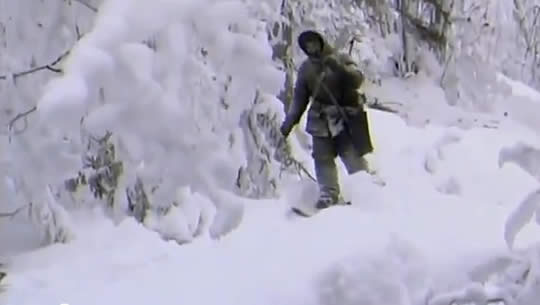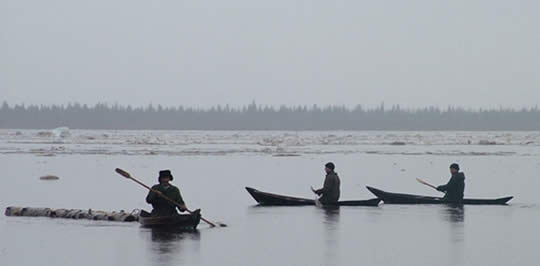 Werner Herzog, known for his idiosyncratic filmography and self-fashioned cult of bravery, has burnished another filmmaker’s footage in “Happy People: A Year in the Taiga” as he did in “Grizzly Man” (based on the footage of Timothy Treadwell, who died while filming the bears he loved.)
Werner Herzog, known for his idiosyncratic filmography and self-fashioned cult of bravery, has burnished another filmmaker’s footage in “Happy People: A Year in the Taiga” as he did in “Grizzly Man” (based on the footage of Timothy Treadwell, who died while filming the bears he loved.)
He reshaped ethnographic footage from Russian videographer Dmitry Yasyukov’s four documentaries about Russian fur trappers in the vast wilderness of the Siberian Taiga.
Herzog’s Bavarian accented singsong narration is buoyed by a score by Klaus Badelt. “They live off the land and are self reliant, truly free,” Herzog explains in admiration as he romances the life of hardship his subjects live in their demanding subarctic wilderness. “No rules, no taxes, no government, no laws, no bureaucracy, no phones, no radio, equipped only with their individual values and standard of conduct.”
We watch a trapper fashion homemade ski’s, traps canoes, even mosquito repellant. The hunters prize their dogs, their partners in the wild, above all else. Indeed they take pride of place in the footage. The trapper’s wives and kids are strictly background artists.
Herzog’s remix follows a yearly cycle of the life of Soloviev, a trapper in the tiny town of Bakhtia, population 300. The thawing Yenisei River makes a lyric opening for the spring section. Soloviev checks his sable traps and wraps the trees with plastic to fend off mice. And, although he has store-bought clothes and a snowmobile, the peasant life is strictly feudal era.
Come summer, the families fish and fight off swarms of mosquitoes, rubbing down their animals and family members with the homemade tar based repellant. In footage shot from Soloviev’s canoe we hunt a swimming reindeer.
Fall is the rainy season and the trappers port their supplies deeper into the forest to avoid being washed out. They rebuild their wooden huts and repair their traps. We see harvest festivities. Soloviev describes his dogs: they’re almost characters in a Checkov play.
Winter, with its 50 below temperature, finds Soloviev harvesting his trapped sables. It’s a satisfying illustration of what Marx called un-alienated labor: a man working the way his father and grandfather did before him, making his compromises with a nature that both challenges him and supplies him.
Other characters include a pair of hard drinking village workers opining about their poor wages, and old woman who shows off her apopotraic dolls, some indigenous Ket people who build a boat, and a local Russian politico who breaks into song and dance.
Editor Joe Bini, a constant Herzog collaborator, creates a film that resembles the best of 70’s era nature documentaries. Herzog’s narration seem less quirky than usual in this romanticized view of Taiga life, free from global materialism.

